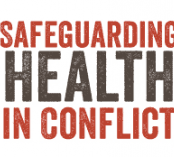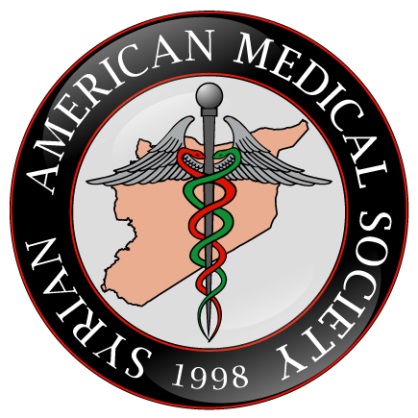
During World Health Worker Week 2015 (April 5-11), the global community came together to recognize the heroic and life-saving services provided by health workers around the world, and collectively advocate for health workforce strengthening to be a core priority in both national and global health agendas. At the Safeguarding Health in Conflict Coalition, several of our members—spanning diverse continents, languages, and focus areas—reminded us this week that huge gaps remain in ensuring health workers are safe, especially during times of armed conflict and political unrest.
To accelerate progress and spur awareness on the need to fill these gaps, we asked some of our members the following question:
From World Health Worker Week to the World Health Assembly this year, what is ONE thing the global community can do to ensure health workers are safe from violence?
Here’s what they had to say:
“The most important thing the global community can do to ensure that health workers are safe from violence is to commit to ending impunity for attack on and interference with them, raising the cost of committing violations of international law. That commitment in turn requires vigorous documentation and reporting of attacks, stigmatizing attackers for breaches of international norms, and assuring accountability in every available forum.”
—Leonard Rubenstein, Director, Program on Human Rights, Health and Conflict (Center for Public Health and Human Rights) Johns Hopkins Bloomberg School of Public Health

“During the war in Gaza last summer, many medical teams and facilities were attacked. Medical staff were killed and medical facilities including ambulances were damaged or ruined. Especially during wartime, we need a direct and urgent joint call from the medical community to governments to avoid attacking medical staff and facilities, no matter what! This could make an impact and may prevent unnecessary casualties.”
—Ran Goldstein, Executive Director, Physicians for Human Rights - Israel

“Realizing global health goals requires more be done to prevent attacks on health workers, hospitals, and ambulances, and to ensure accountability when such attacks do occur. There’s an urgent need for increased monitoring by the global community in a form that is timely, transparent, and consistent. Such monitoring should be sufficiently comprehensive to cover the wide range of such attacks, from the targeted killing of polio vaccination workers, to military attacks against hospitals and clinics, to the use of criminal law against health workers who provide emergency care to anti-government protesters.”
—Richard Pearshouse, Senior Researcher, Health and Human Rights, Human Rights Watch

“The global community has a moral obligation to protect the human rights of health workers, who put their own lives on the line every day to save the lives of others. We need to use every opportunity and every channel possible to ensure that the voices of health workers and the communities they serve around the world are heard. We must share their stories, and make sure that their lives count—and are counted. Only by gathering more evidence about attacks on health workers and telling their stories can we convince policy-makers and global institutions to prioritize putting an end to these atrocities and to invest more resources in protecting those who, ultimately, protect all of us.”
—Laura Hoemeke, Director, Communications and Advocacy, IntraHealth International

“The international community must proliferate international humanitarian law standards that safeguard medical practitioners in conflict scenarios into international human rights law. If we are ever going to see health workers protected at all times and in all conflicts, work on a new addition to the human rights treaty regime that incorporates the principles of medical impartiality fully into human rights law must begin today.”
—James Suzano, DMI, Americans for Democracy and Human Rights in Bahrain

“It is important to raise awareness about the international humanitarian laws which protect health service providers, and also ensure all parties understand that these health care providers ought to operate under the humanitarian principles of neutrality, impartiality, and independence.”
—Justine Piquemal, Director, Agency Coordinating Body for Afghan Relief and Development

“Despite overwhelming evidence of the deliberate targeting of healthcare and of health workers as a standard tactic of armed conflict, disappointingly, progress in protection remains a distant aspiration. We consider that a feasible option is a dedicated, well-resourced UN protection force, which ensures that, whatever the political situation, any threat of or actual attack on healthcare or health workers will be immediately met with a powerful protective response until the conflict has resolved. The UN Security Council must consider this option now and a pilot UN protection force in Syria would be a promising start.”
—David Southall and Dr. Rhona MacDonald, Honorary Medical and Executive Directors, Maternal and Child Health Advocacy International (MCAI)

“In Syria and other areas of conflict, attacking healthcare workers, targeting ambulances, and bombing medical facilities have become the rule not the exception. This is unacceptable. It is against all norms, international laws, or medical ethics. Accountability has been forgotten, which is setting a dangerous trend. Unless violators of medical impartiality are held accountable, such attacks will become the new normal.”
—Zaher Sahloul, President, Syrian American Medical Society
The Safeguarding Health in Conflict Coalition is a group of over 30 organizations who share a commitment to the protection of health workers, services, and infrastructure from violence. Members include notable academic institutions, international and country-level NGOs with a strong focus on human rights and/or health, relief organizations, and professional associations. The secretariat is shared by the Center for Public Health and Human Rights at the Johns Hopkins Bloomberg School of Public Health and IntraHealth International. Join us. To learn more about the coalition, please contact us.

